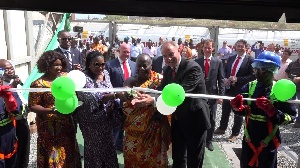 First tank cleaning station launched
First tank cleaning station launched
The first tank cleaning station in West Africa meant for cleaning of export containers has been launched in the habour city.
The facility which was established by Van den Bosch in collaboration with Multipurpose Terminals Ghana Ltd is expected to eliminate unnecessary, expensive and unsustainable movements of empty containers between West Africa and Europe.
Hitherto, empty containers used in carrying shea butter and food items are shipped to Europe for cleaning before they are brought back for loading. The Netherland Ambassador to Ghana, Ron Strikker said the cleaning station will allow the private sector to increasingly transport goods in bulk leading to important savings on the costs for handling, storage and packaging of those goods.
He said for entrepreneurs to thrive and investments to flow in, a conducive and enabling climate is essential.
“We will continue to advocate on behalf of the private sector and seek cooperation with Ghana to this effect, to ensure that this is not the last, but only the latest Dutch investment in Ghana,” he said.
He said the cleaning station is very good for the environment “because we do not send empty containers and tins back to Europe, we clean them here, we make sure of course that the cleaning water is disposed off in a very responsible way and it is very good for the export from Ghana to the Netherlands.”
The Managing Director of Van Den Bosch, Ton Bothof said Ghana became the suitable country for the establishment of the cleaning station because of food grade inbound and outbound transport flows as well as the ease of doing business.
He said the facility which is the first in West Africa conforms to highest European standards.
He added that the facility will offer new job opportunities and knowledge leading to an environmental friendly logistical transport flow. The Managing Director of Multipurpose Terminals Ghana Ltd, Bas De Vaal expressed optimism that the facility will generate some traffic for the port authority.
“We have more business for the port, we can open new markets for them and we can create more work for the port and more jobs by offering a solution,” he said.
He said Ghanaians have been trained to work in the facility, hence, creating several jobs.